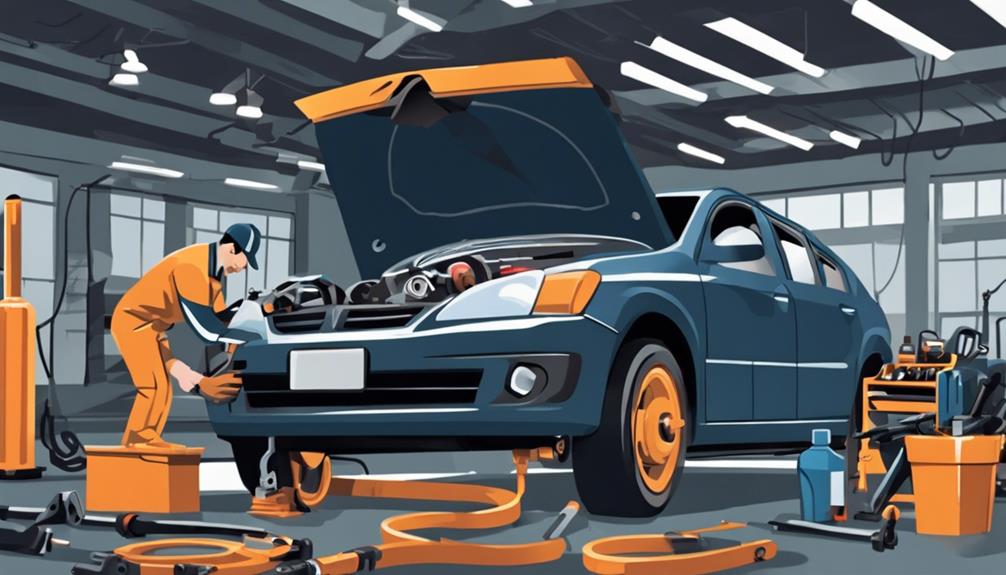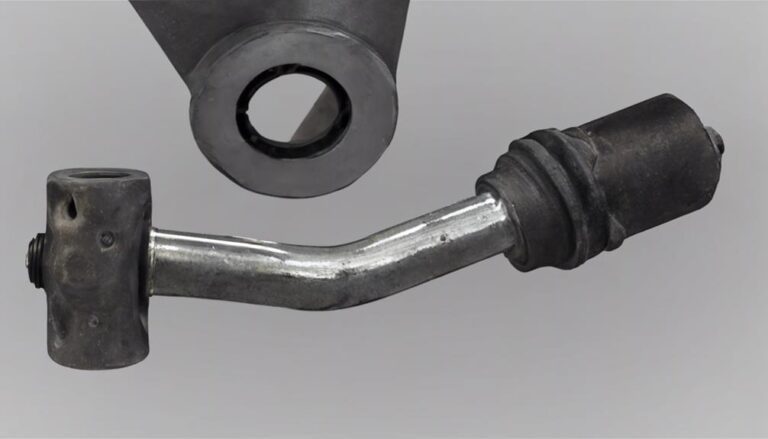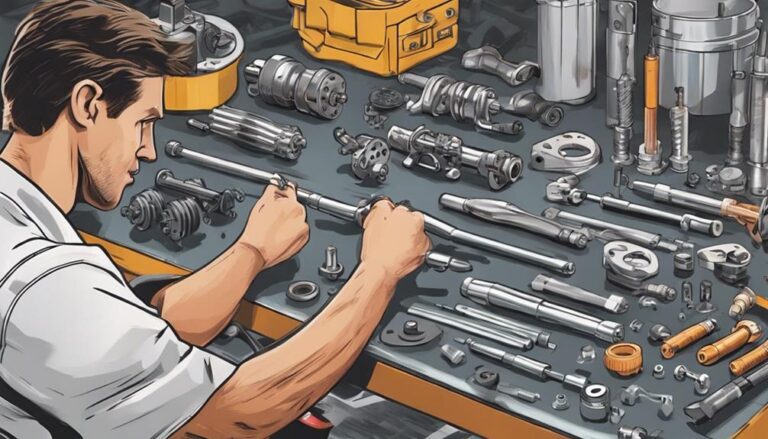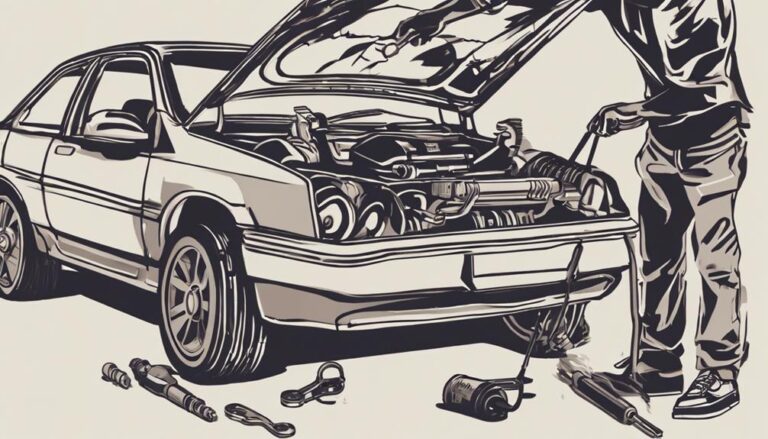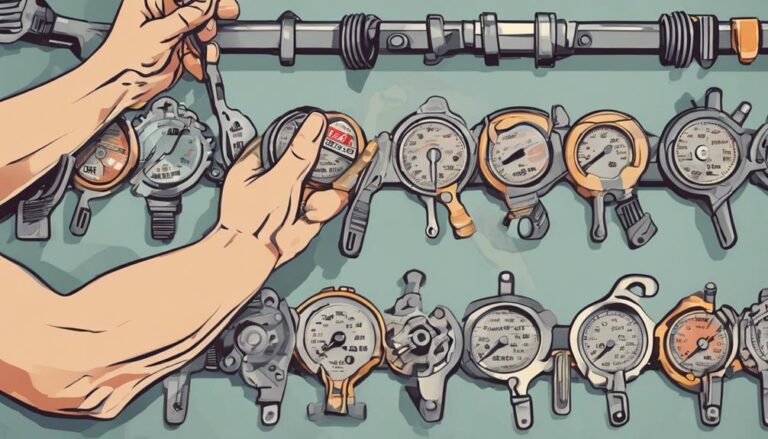Fixing Noisy Suspension: Expert Tips for Car Owners
Imagine driving down the road, and instead of the usual hum of the engine, you're greeted by an orchestra of creaks and groans coming from your car's suspension. It's a frustrating situation, but fear not, there are expert tips that can help you silence those noisy suspension woes.
From simple DIY fixes to knowing when to seek professional help, understanding the ins and outs of your car's suspension system can make all the difference in your driving experience.
So, let's explore the world of fixing noisy suspension together and get you back on the road in peace.
Key Takeaways
- Regularly inspect and tighten suspension parts to prevent noises.
- Consider replacing worn shocks or struts for quieter operation.
- Consult skilled mechanics for accurate diagnosis and targeted repairs.
- Maintain proper alignment and lubrication to reduce future suspension noise.
Common Noises in Car Suspension
If your car's suspension system is making noises, it's crucial to identify the specific components that may be causing the issue. Suspension maintenance is key to ensuring a smooth and quiet ride. Noise diagnosis plays a vital role in pinpointing potential problems within the suspension system. Common sources of noise in car suspensions include issues with struts, leaf spring shackles, control arms, ball joints, and shock absorbers.
Loose nuts on struts can result in rattling sounds, while bends in leaf springs may cause creaking noises. Dirt accumulation in ball joints can lead to clicking or popping sounds, and cracked bushings on shock absorbers often produce clunking sounds. When turning the steering wheel, unusual noises may indicate problems within the suspension system.
Understanding these common noises and their possible sources is essential for effectively troubleshooting and addressing any underlying issues. By being aware of these potential problems, you can proactively maintain your suspension system and enjoy a quieter driving experience.
Identifying Suspension Noise Sources
To accurately identify suspension noise sources, closely inspect components such as struts, leaf spring shackles, control arms, ball joints, and shock absorbers for potential issues. Diagnostic techniques involve listening for noise variations, checking for visible damage or wear, and performing a bounce test on each corner of the vehicle. Noise isolation can be achieved by identifying whether the noise is present during driving, over bumps, or when turning. Here is a table summarizing potential sources of suspension noise:
| Suspension Component | Potential Issues |
|---|---|
| Struts | Loose nuts |
| Leaf Spring Shackles | Bends in springs |
| Control Arms | Worn bushings |
| Ball Joints | Dirt accumulation |
| Shock Absorbers | Cracked bushings |
DIY Solutions for Noisy Suspension
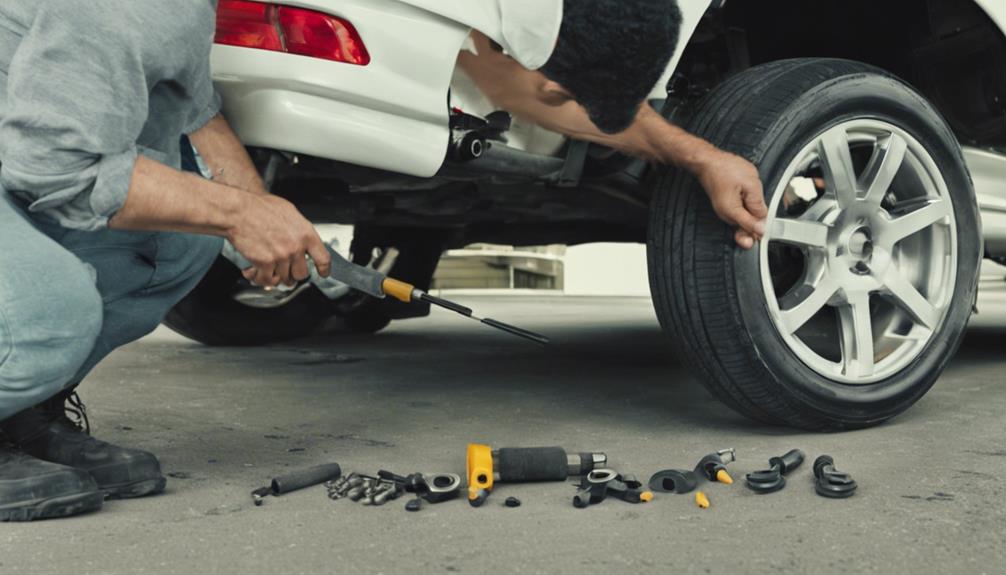
Inspecting and tightening loose suspension parts is a fundamental DIY solution for addressing noisy suspension issues. To effectively troubleshoot and diagnose suspension noise, follow these steps:
- Check for Loose Suspension Parts: Inspect all suspension components for any signs of looseness or play. Tighten bolts and nuts to eliminate potential sources of noise.
- Examine Bushings: Look for worn or damaged bushings that could be causing the noise. Replace any faulty bushings to improve suspension performance.
- Assess Shocks and Struts: If shocks or struts show wear or scratches, consider replacing them as they may be contributing to the noise.
- Align Suspension Components: Ensure that all suspension parts are properly aligned and positioned. Misaligned components can lead to noise and discomfort.
- Test Drive: After making DIY repairs, take the vehicle for a test drive to confirm that the noise issue has been resolved. This final step helps verify the effectiveness of your actions.
Professional Repair Options Available
For professional repair options to address noisy suspension, consult expert technicians to accurately diagnose and resolve the underlying issues. Suspension repair services provided by skilled mechanics offer a comprehensive approach to identifying the specific components causing the noise in the suspension system. These professionals possess the necessary knowledge and tools to effectively fix noisy suspension problems, ensuring that your vehicle's suspension system is restored to optimal working condition.
Mechanic recommendations are crucial when seeking professional repair options for noisy suspension. Experienced technicians can pinpoint the root cause of the noise and provide targeted solutions to eliminate it. By choosing professional repair services, you not only address the current noise issue but also prevent further damage that could compromise your safety while driving.
Opting for professional suspension repair is a proactive step towards maintaining your vehicle's performance and safety. Trusting expert technicians to handle noisy suspension problems guarantees a thorough assessment and precise repairs, giving you peace of mind on the road.
Preventing Future Suspension Noises
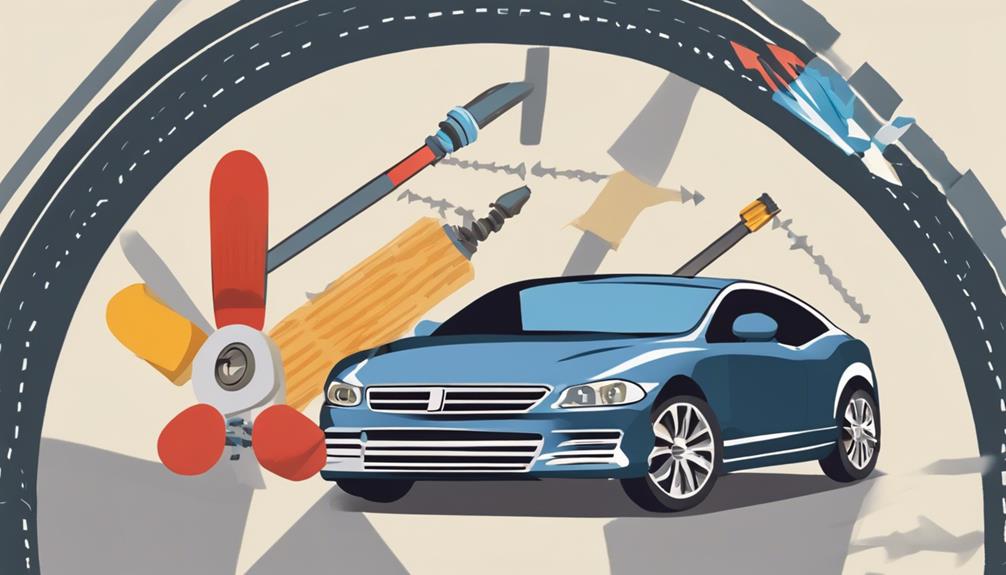
Regularly maintaining and lubricating your suspension components is crucial to prevent future noises caused by friction and wear. To ensure a quiet and smooth ride, follow these expert tips:
- Regular Maintenance: Inspect and lubricate suspension components routinely to prevent noise from friction.
- Address Issues Promptly: Promptly address any loose or damaged suspension parts to avoid future noises.
- Quality Parts: Use high-quality suspension parts to reduce the likelihood of noise issues.
- Proper Alignment: Ensure proper wheel alignment to prevent uneven tire wear and potential suspension noise.
- Driving Habits: Avoid rough driving habits and road conditions to minimize stress on the suspension system and prevent noise.
Frequently Asked Questions
How Do I Stop My Suspension From Making Noise?
To stop your suspension from making noise, inspect for loose parts or worn-out components. DIY solutions involve checking bushings and control arms. If needed, seek professional help for replacing shocks or struts. Prevention tips include regular maintenance.
What Are the 3 Common Suspension Noises?
To maintain your suspension, listen for clunking, squeaking, or rattling noises. Troubleshoot by checking ball joints, bushings, and tie rods for wear. Grinding sounds when turning may signal wheel bearing issues. Seek expert advice for proper maintenance.
How Much Does It Cost to Fix Noisy Suspension?
When fixing a noisy suspension, costs can vary from $200 to $1,500 depending on the issue and vehicle. DIY options may reduce expenses, but labor costs for professional services, parts, and diagnostics influence overall pricing.
How Can I Improve the Suspension Comfort of My Car?
To improve the suspension comfort of your car, consider suspension upgrades like high-quality shock absorbers and coilover systems. Use tuning techniques such as adjusting ride height and damping settings for a smoother, customizable driving experience.
Conclusion
Now that you've learned how to diagnose and address noisy suspension issues in your vehicle, imagine the smooth, quiet ride you'll experience as you cruise down the road.
By implementing the expert tips and DIY solutions provided, you can enjoy a peaceful driving experience while ensuring the longevity of your suspension system.
Stay proactive in your maintenance efforts to prevent future noises and keep your car running smoothly for years to come.
Drive on with confidence!

